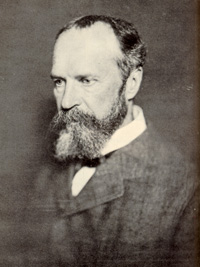Sarah LuriaAssociate Professor, Department of English |
William James was a philosopher and psychologist who spent his entire career at Harvard. James wrote his most famous essay, "The Will to Believe" in 1896, one year before delivering his speech at the dedication of the Shaw memorial. In the essay he argues that "our 'passional nature' may commit us to beliefs when we cannot postpone action and where there is not enough evidence to decided the question on intellectual grounds." During this period of his life, James spoke out on several public issues, including the "epidemic" of lynching that had plagued the nation since the end of the Civil War. He would eventually, in 1909, write about his co-speaker at the Shaw dedication, Booker T. Washington. Washington was engaged in an ongoing debate with scholar W.E.B. DuBois about the path African-Americans should follow for their advancement. Washington aruged that African-Americans should learn manual skills; DuBois argued they should get academic training and become politically active. James believed both men were right. James did not fight in the Civil War, although he would certainly have been eligible to do so. There is little evidence explaining his decision. His brother, Henry, the famous American novelist, also did not fight. But his other two brothers, Garth Wilkinson ("Wilky") and Robertson, did, both serving in "Negro Regiments." Robertson served in the Massachusetts 55th, and, in 1863, Wilkie joined Shaws' Massachusetts 54th. He was wounded during the assault on Fort Wagner, during which he saw Shaw killed. Wilkie survived the war; he died in 1883. William James agreed to deliver an oration for the unveiling of the Shaw memorial, but was so nervous about the event that he uncharacteristically memorized his speech. He described the day to his brother Henry, who lived in England: The weather was cool and the skies were weeping, but not enough to cause any serious discomfort. They simply formed a harmonious background to the pathetic sentiment that reigned over the day. It was very peculiar, and people have been speaking about it ever since--the last wave of the war breaking over Boston, everything softened and made poetic and unreal by distance. . . . (Allen 388)Sources: GayWilson Allen, William James (New York: Viking, 1967), 93, 387-88. "William James," American National Biography (New York: Oxford, 1999).
|
 William
James (1842-1910)
William
James (1842-1910)